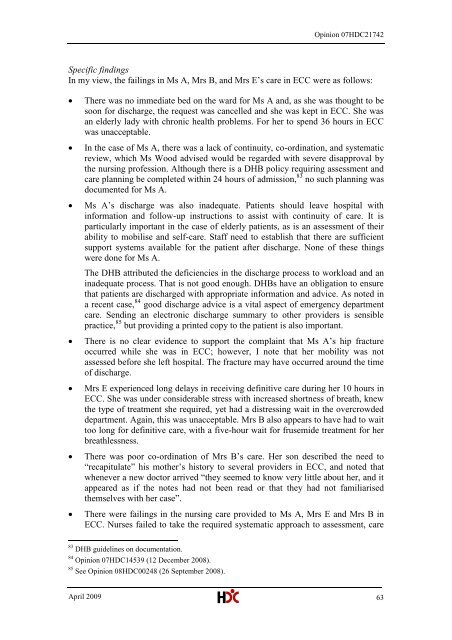North Shore Hospital report - New Zealand Doctor
North Shore Hospital report - New Zealand Doctor
North Shore Hospital report - New Zealand Doctor
Create successful ePaper yourself
Turn your PDF publications into a flip-book with our unique Google optimized e-Paper software.
Opinion 07HDC21742Specific findingsIn my view, the failings in Ms A, Mrs B, and Mrs E‘s care in ECC were as follows:There was no immediate bed on the ward for Ms A and, as she was thought to besoon for discharge, the request was cancelled and she was kept in ECC. She wasan elderly lady with chronic health problems. For her to spend 36 hours in ECCwas unacceptable.In the case of Ms A, there was a lack of continuity, co-ordination, and systematicreview, which Ms Wood advised would be regarded with severe disapproval bythe nursing profession. Although there is a DHB policy requiring assessment andcare planning be completed within 24 hours of admission, 83 no such planning wasdocumented for Ms A.Ms A‘s discharge was also inadequate. Patients should leave hospital withinformation and follow-up instructions to assist with continuity of care. It isparticularly important in the case of elderly patients, as is an assessment of theirability to mobilise and self-care. Staff need to establish that there are sufficientsupport systems available for the patient after discharge. None of these thingswere done for Ms A.The DHB attributed the deficiencies in the discharge process to workload and aninadequate process. That is not good enough. DHBs have an obligation to ensurethat patients are discharged with appropriate information and advice. As noted ina recent case, 84 good discharge advice is a vital aspect of emergency departmentcare. Sending an electronic discharge summary to other providers is sensiblepractice, 85 but providing a printed copy to the patient is also important.There is no clear evidence to support the complaint that Ms A‘s hip fractureoccurred while she was in ECC; however, I note that her mobility was notassessed before she left hospital. The fracture may have occurred around the timeof discharge.Mrs E experienced long delays in receiving definitive care during her 10 hours inECC. She was under considerable stress with increased shortness of breath, knewthe type of treatment she required, yet had a distressing wait in the overcrowdeddepartment. Again, this was unacceptable. Mrs B also appears to have had to waittoo long for definitive care, with a five-hour wait for frusemide treatment for herbreathlessness.There was poor co-ordination of Mrs B‘s care. Her son described the need to―recapitulate‖ his mother‘s history to several providers in ECC, and noted thatwhenever a new doctor arrived ―they seemed to know very little about her, and itappeared as if the notes had not been read or that they had not familiarisedthemselves with her case‖.There were failings in the nursing care provided to Ms A, Mrs E and Mrs B inECC. Nurses failed to take the required systematic approach to assessment, care83 DHB guidelines on documentation.84 Opinion 07HDC14539 (12 December 2008).85 See Opinion 08HDC00248 (26 September 2008).April 2009 63
















